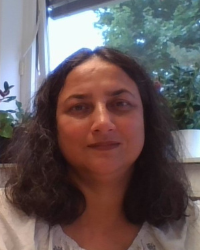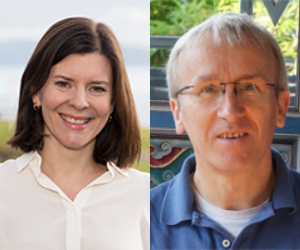
RELIGHT aims to assist established research groups in becoming global leaders in their fields, reaching the status of ‘research and innovation excellence.’ The following research groups have been selected and will receive funding for the next three years (2022-2024).
Each year, the three groups provide a report outlining progress made and activities.
Building and Evaluating “digital AMR literacy” to Combat AMR: Case study from India (DigitalAMR)
 The DigitalAMR research team, led by Arunima Sehgal Mukherjee, post-doctoral research fellow at the Department of Informatics at UiO, will explore the use of digital literacy to address the challenge of combatting antimicrobial resistance (AMR).
The DigitalAMR research team, led by Arunima Sehgal Mukherjee, post-doctoral research fellow at the Department of Informatics at UiO, will explore the use of digital literacy to address the challenge of combatting antimicrobial resistance (AMR).
A concerning rise in AMR globally threatens the very core of modern medicine, ultimately affecting health security, poverty levels, economic growth, food security and the achievement of all the UN Sustainable Development Goals (SDGs). AMR is a “wicked problem” involving different perspectives medical, technological and social, which imply there is not one best approach. AMR is a multi-faceted challenge shaped by inter-connected conditions of human, animals and environmental health, and situated in deep-rooted societal and political structures, which shape everyday practices of people. Recent studies emphasize the disproportionate effects of low-and-middle-income countries (LMICs) due to their high burdens of infectious diseases, poor diagnostics, inadequate awareness, unregulated use of antibiotics and historically existing social structures that discriminate against the poor.
Research shows that ‘lifestyle choices’ impact AMR, and one of most effective actions to reduce, and control involve changes in social practices, improving hygiene, and cultivating more responsible antibiotic prescription and consumption. Enabling these changes fundamentally requires building awareness, access and understanding of health information from trusted sources and creating health literacy and lifestyle changes.
DigitalAMR will work with the assumption that co-production of health literacy content can help expand people’s agency to better navigate these structural inequities to mitigate the AMR risks and enhance health equity as the poor and disadvantaged are most badly affected by AMR. Health literacy entails people’s knowledge, motivation, and competence to access, understand, appraise, and apply health information to make judgments on their health seeking behavior to improve quality of life. The project will also contribute to building systematic methodologies for evaluating the effectiveness of digital health promotion (DHP) as interventions for strengthening health literacy in LMIC contexts. The empirical base will be in India, a global AMR hotspot, with compromised access to and understanding of key information about AMR use and extremely poor disease awareness, particularly in rural settings.
Innovation and Partnership in Pandemic Response
 The Innovation and Partnership in Pandemic Response will be co-led by Katerini Storeng, head of the interdisciplinary Global Health Politics research group, hosted by the Centre for Development and the Environment (SUM), and Prof. Christoph Gradmann, head of the Department of Community Medicine and Global Health, Institute of Health and Society (Faculty of Medicine), UiO. This group was awarded RELIGHT funding from 2019-2021 and will continue where they left off while striving towards the development of joint projects with the following described focus. To read more about the work of this group during the 2019-2021 period – see here.
The Innovation and Partnership in Pandemic Response will be co-led by Katerini Storeng, head of the interdisciplinary Global Health Politics research group, hosted by the Centre for Development and the Environment (SUM), and Prof. Christoph Gradmann, head of the Department of Community Medicine and Global Health, Institute of Health and Society (Faculty of Medicine), UiO. This group was awarded RELIGHT funding from 2019-2021 and will continue where they left off while striving towards the development of joint projects with the following described focus. To read more about the work of this group during the 2019-2021 period – see here.
Pandemic preparedness efforts have primarily been operationalized through biomedical and technological interventions such as vaccines, diagnostics and drugs, mobile phone technologies and artificial intelligence that predict, and chart the course of, an outbreak. Such technological solutions are often produced and promoted by private sector actors in both the for-profit and non-profit sectors. These innovations are important and necessary but are not enough on their own to make the world a safer place. Questions remain about how technologies can be integrated into and complement investments in systems and structures for global health security, including national health systems.
Understanding the changing dynamics of pandemic preparedness and response requires interdisciplinary research rooted in social sciences, capable of unpacking how socio-political dynamics and power structures interact with governance arrangements and biomedical or technological practices. The first awarded RELIGHT funding (2019-2022) supported the successful application for two research projects examining the rise of pandemic technologies and the role that private-sector actors play in pandemic responses. Support from the current RELIGHT funding (2022-2024) will enable the team to take this research to the next level, this time integrating historical and legal perspectives and thus increasing their competitiveness in the international competition for research funding.
Interdisciplinary Approaches to Health Equity: The CoRE HGS Initiative for Advancing Global Health Research in Gender and Sexual Minorities
The "Africa Europe Cluster of Research Excellence on Health, Ge nder, and Sexualities" (CoRE HGS), a collaboration between six African and two European universities, has been officially recognized as part of a joint initiative by the African Research Universities Alliance (ARUA) and The Guild of European Research-Intensive Universities (The Guild)1.
nder, and Sexualities" (CoRE HGS), a collaboration between six African and two European universities, has been officially recognized as part of a joint initiative by the African Research Universities Alliance (ARUA) and The Guild of European Research-Intensive Universities (The Guild)1.
This cluster is led by Professor Kåre Moen, Institute of Health and Society at the University of Oslo. It is one of the 20 selected from over 70 initial proposals, consists of researchers from nine universities (six in Africa and three in Europe) and was recognized for its academic excellence and commitment to equitable collaborative research and researcher training. The CoRE HGS is co-led by the University of Oslo and the University of Pretoria and aims to address critical health issues and health disparities in gender and sexual minority populations. Our commitment extends beyond individual projects, envisioning a long-term collaborative undertaking supported by the top management of each member university.
In the coming years, CoRE HGS is set to embark on a series of impactful collaborative activities. Our plan includes conducting joint research projects, engaging in shared teaching and supervision, establishing a master's degree program, and launching a PhD research school. These initiatives will be designed to benefit candidates from both Africa and Europe, fostering a dynamic exchange of knowledge and expertise.
Through this cluster, the global health milieu at the University of Oslo stands to gain significantly. The collaboration will not only enhance UiO’s global health research and researcher training, but also strengthen its international ties and reputation. By actively participating in this transcontinental exchange of ideas and resources, UiO will play a pivotal role in shaping the future of global health education and research.